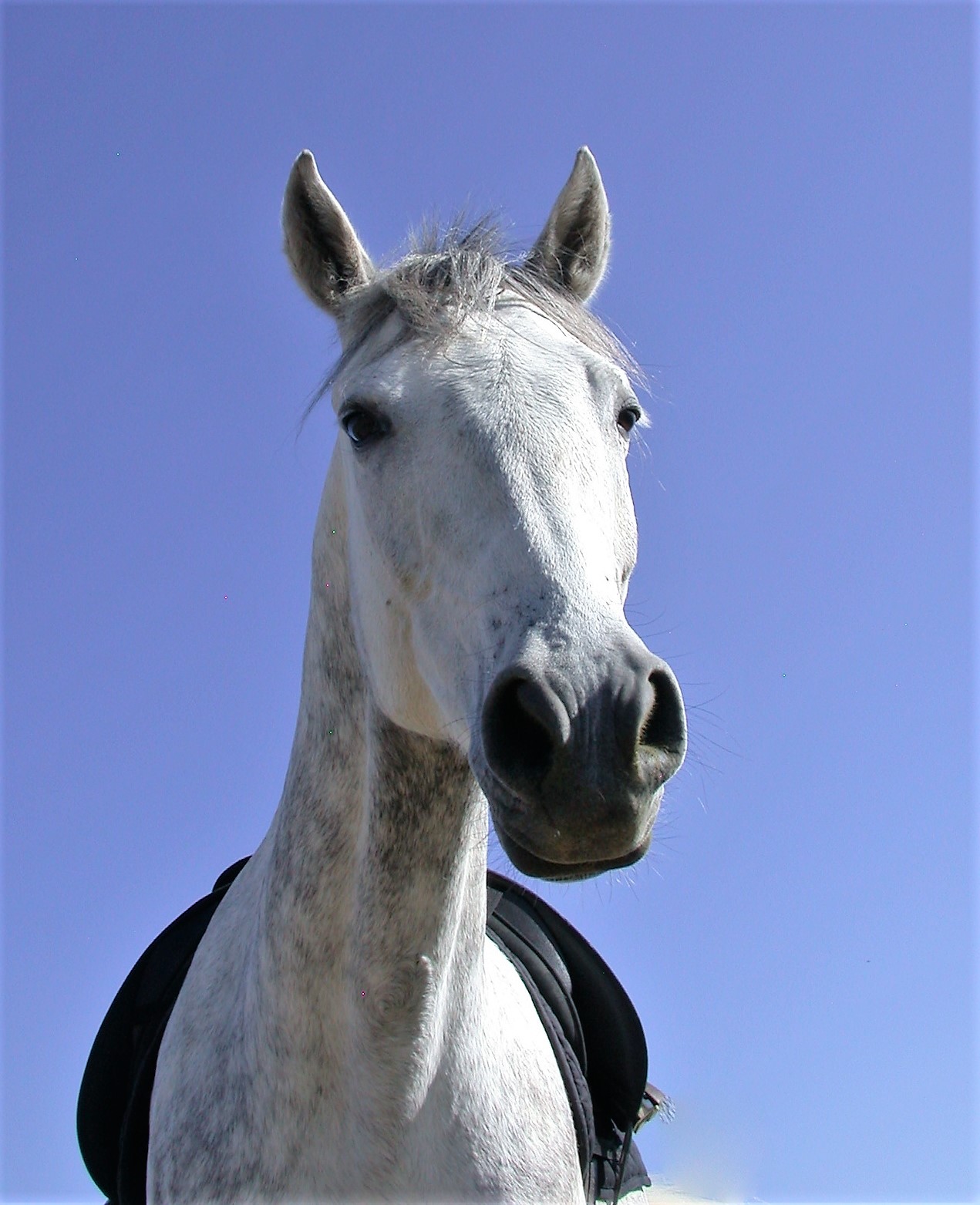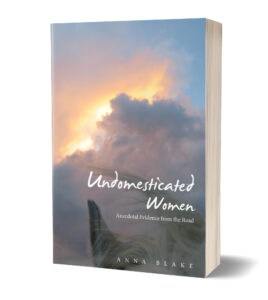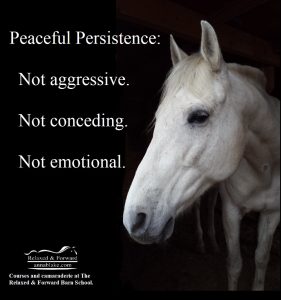
There’s a woman and a tall young horse, moving in perfect strides together but with a healthy space between them. It’s as if the rope is invisible, her hands low at her sides. They continue walking, turning to the right and the left, stride by stride, with no visible cues. That sweet space between them held steady by our breath. The horse’s neck is long and relaxed. The woman’s body is soft.
Or maybe the woman is riding the horse, and his ears are forward as he moves with an energetic stride on a slack rein. In the first trot stride, he lifts his back as he floats over ground poles. The woman exhales as he melts to a halt, square and straight with a slack rein. The rider betrays herself with a smile so big her lips stick to her gums. There are no whips, no one is swinging ropes. And the less that was asked for, the more he offered. They are lifelong friends, but brand-new each moment.
Now is a good time to tell you this lovely young horse has been colicking five or six times a month for the last year, always around feeding time. Yes, he had ulcers. I’d known for years, and we had treated him repeatedly with Gastrogard. Each time, the ulcers came roaring back on day thirty-one, worse than before. It was 2008, he was five years old, and I’d spared no expense on vets but found no resolution. We weren’t even sure ulcers were the key problem. Many times, ulcers mask an underlying condition that needs help first. We didn’t know what we didn’t know. Now we were trying acupuncture and Chinese herbs, but no luck so far.
This is what I did know. I was doing my best for him, and it wasn’t good enough.
Should I be riding him? If fear-based training or harsh riding can cause ulcers, couldn’t Affirmative Training help reduce anxiety? After all, the fear of pain is almost as bad as pain. Wouldn’t a confident horse deal with the whole condition better? Maybe I could at least distract him for a little while.
So that was my plan. Nube was my first personal horse that I’d started from a foal by listening to his Calming Signals and using my Affirmative Training methods. Knowing his chronic ulcer situation, I listened even closer. I did all the best practices I knew. Always tacking up with a hay bag, so his belly wasn’t empty. We used a neck ring to warm up. I never stayed on longer than a half-hour, and only a few times a week. Music played during every ride, I let him move out, and never a hint of punishment. Just encouragement. We warmed up systematically and he got stronger. Letting him make choices, and always letting him answer in his own time, gave him confidence. The result was a young horse who was relaxed and willing. If I’d seen anxiety, we would have quit immediately. Instead, Nube pulled to go to the arena because only good things happened there.
Do you ever wonder how we got so complacent about harsh training? It’s a shame that intimidating horses is so effective, at least short term. We know a horse trained with fear will always look to his own safety first. The rider will always have to hold a line of aggression to maintain the horse’s fear. Always ready to threaten with a rope or a whip. Affirmative training requires a bit more patience. But the sweetness of having a horse who volunteers more than makes up for the time spent.
“Less is more.” Everyone repeats the adage, but it’s our human nature to escalate. It’s as if we think we’re easier to understand when we yell. We come by it naturally, but horses never get used to it. They don’t “desensitize” to us. Not to mention, their senses are better than ours. We aren’t quiet even when we whisper. So, we have to gain self-awareness and then let the loud go.
It’s logical. Don’t we feel the same about aggressive people? When someone is yelling and threatening, we resist them. Or we cower and dread their presence. When someone speaks quietly, they draw us in. It feels intimate to speak quietly.
In forging a partnership with a horse, there’s the human half. We trust our cue has been heard and allow our horse the time he needs to form a response that isn’t a hurried, fearful reaction. Some horses pause, expecting us to escalate. Then, we must out-wait their waiting before they begin to think of a response. Too often we repeat the cue louder just as the horse is about to answer. We interrupt them, and they lose confidence. If we do it right, we learn patience while giving our horse the freedom to answer without threat.
The challenge for the horse is their past. They live with the memory of their first trainer, who formed their fundamental beliefs about humans. If they’ve always been yelled at, whacked with training aids, or teased and baited, that fear and anxiety linger. Even on a good day, every moment is life or death for a horse, so this memory of humans as predators fits their mindset well. Horses judge the present by their memory. Their feelings are real. They don’t have the brain function to fake it.
What we think is subtle finesse is loud to a horse. Human body language is blunt and jagged by comparison. We wave our arms when our eyes are enough. We’re even aggressive with affection, but ironically think it’s possible for a horse to ignore us. A horse who looks away or grazes is just telling us he needs a moment. Giving you no answer is an answer, if you listen to his body’s calming signals.
Horses escalate when we do, so it really is that simple. Horse training is like a game of chicken. Rather than be the last one to swerve, we have to be last to escalate. The last one to lose patience. Why are we in such a hurry if we love what we do?
What we don’t understand about horses is that the problem isn’t their resistance. The problem is that they are more intelligent than we give them credit for. It’s that they try too hard to get along. They want to get it right, not dumbed down by outdated training methods. When we ask for less, we open the door for them to step through and be who they honestly are, which is pretty near perfect already.
But Nube didn’t have that fearful start. He was brave and sensitive. His canter filled an arena, he was intelligent and trusting. The horse of a lifetime, and I was finally good enough to meet him as an equal. He was so much more open with me than other horses I’d known. There was no gap between us.
But with that immense possibility, came the lessons about pain and undiagnosable physical challenges beyond our ability to help. How could this big bold horse be so frail at the same time? How would we find solid ground in a storm of such impossible extremes?
[Eighth in a series called Nube’s Story]

…
Available next week! Undomesticated Women, Anectdotal Evidence from the Road, is my new travel memoir. Ride along with us over 30 states, 2 oceans, and 14k miles with me and my dog, Mister. Available at all online booksellers and from me, at the end of October.
…
If you appreciate what I do, please Subscribe to this blog or join us at The Barn School.

Anna Blake, Relaxed & Forward
Want more? Become a “Barnie.” Subscribe to our online training group with affirmative demonstration videos, audio blogs, daily quotes, free participation in “group lessons”, and live chats with Anna. Become part of the most supportive group of like-minded horsepeople anywhere.
Anna teaches ongoing courses like Calming Signals and Affirmative Training at The Barn School, along with virtual clinics and our infamous Happy Hour. Everyone’s welcome.
Visit annablake.com to find archived blogs, purchase signed books, schedule a live consultation, subscribe for email delivery of this blog, or ask a question about the art and science of working with horses.
Did you ever find a cure for this horse?
No, but all horses die. It’s about what happens before that.
Lovely essay. Lovely Nube. I sense the beginning of another book! At least I hope so!
Thanks, Linda. Always another book…
Though your time with Nube was short (I’m assuming), no one can take away the memories you have of your togetherness. It’s like the times I felt oneness with Dover. I did not want that moment to end with him. It is that feeling that I will always remember. He was the horse of my lifetime.
You are so right, our time is ours forever. Thanks Lynell
wonderful to read about Nube and affirmative training. The medical stuff just sucks though….. (still good to read about…!)
Sometimes the alternate ride is more important… Thanks Kate
Reading this and seeing his photo, I can feel the energy and strength of soul of this beautiful horse, Nube! How blessed was he to have you as as his person! I am always a better person and horsewoman from reading you. Thank you for sharing so much of yourself.
Thank you, Monica. But I was the lucky one.
So often I pull a sentence or a paragraph out of your work that just strikes home and stays in the mind and heart and that I pass along to others, as yours. For example, “Too often we repeat the cue louder just as the horse is about to answer. We interrupt them, and they lose confidence. If we do it right, we learn patience while giving our horse the freedom to answer without threat.” None of our horses are ours. They belong to the Ghost Herd. We have them for a split second and then they are gone, having taught us what we needed to learn, and then asked us to pass down to our next horse, and so on. As you, and we, are doing now. Thank you, from them.
That concept is a keeper. Thanks, Kathy